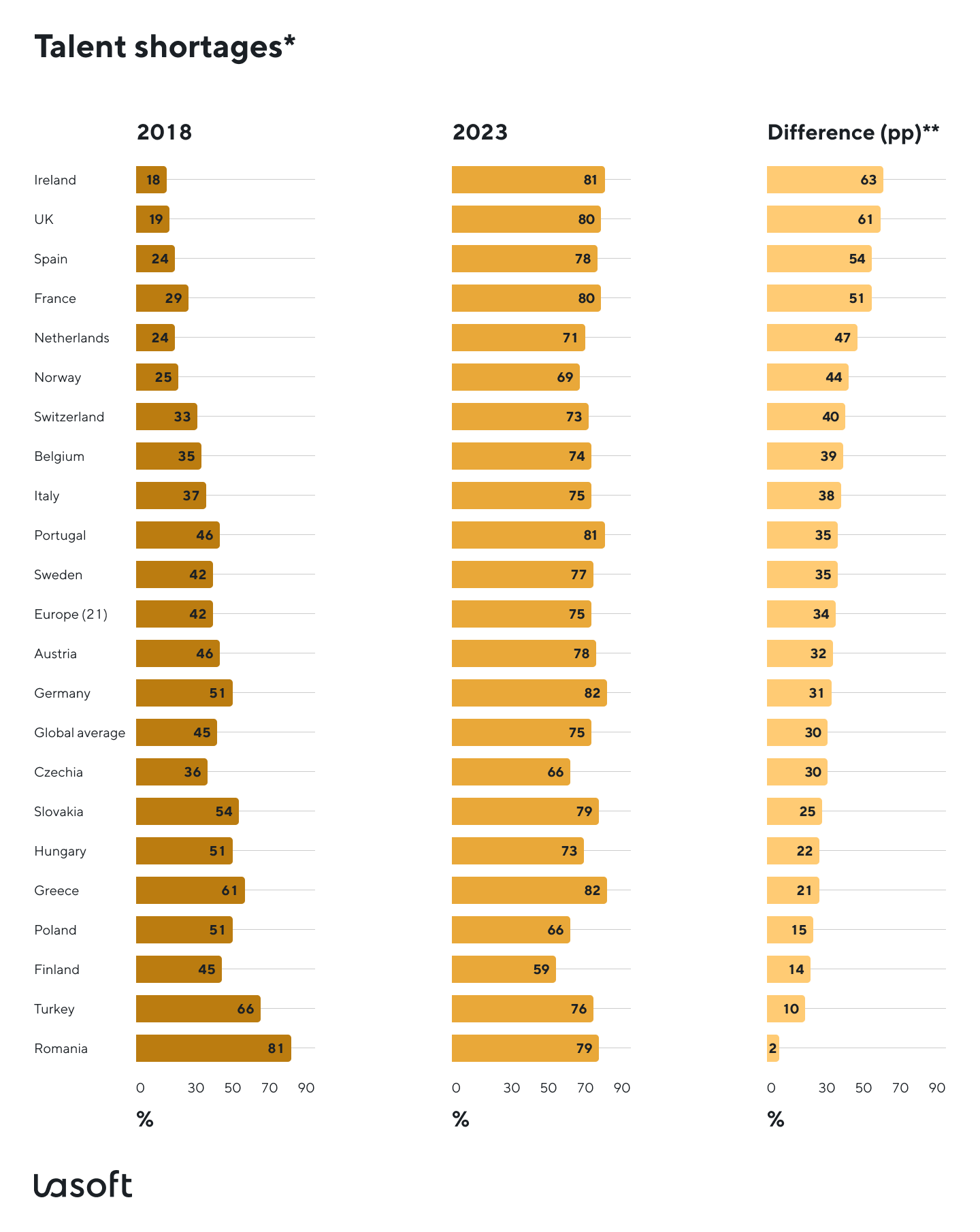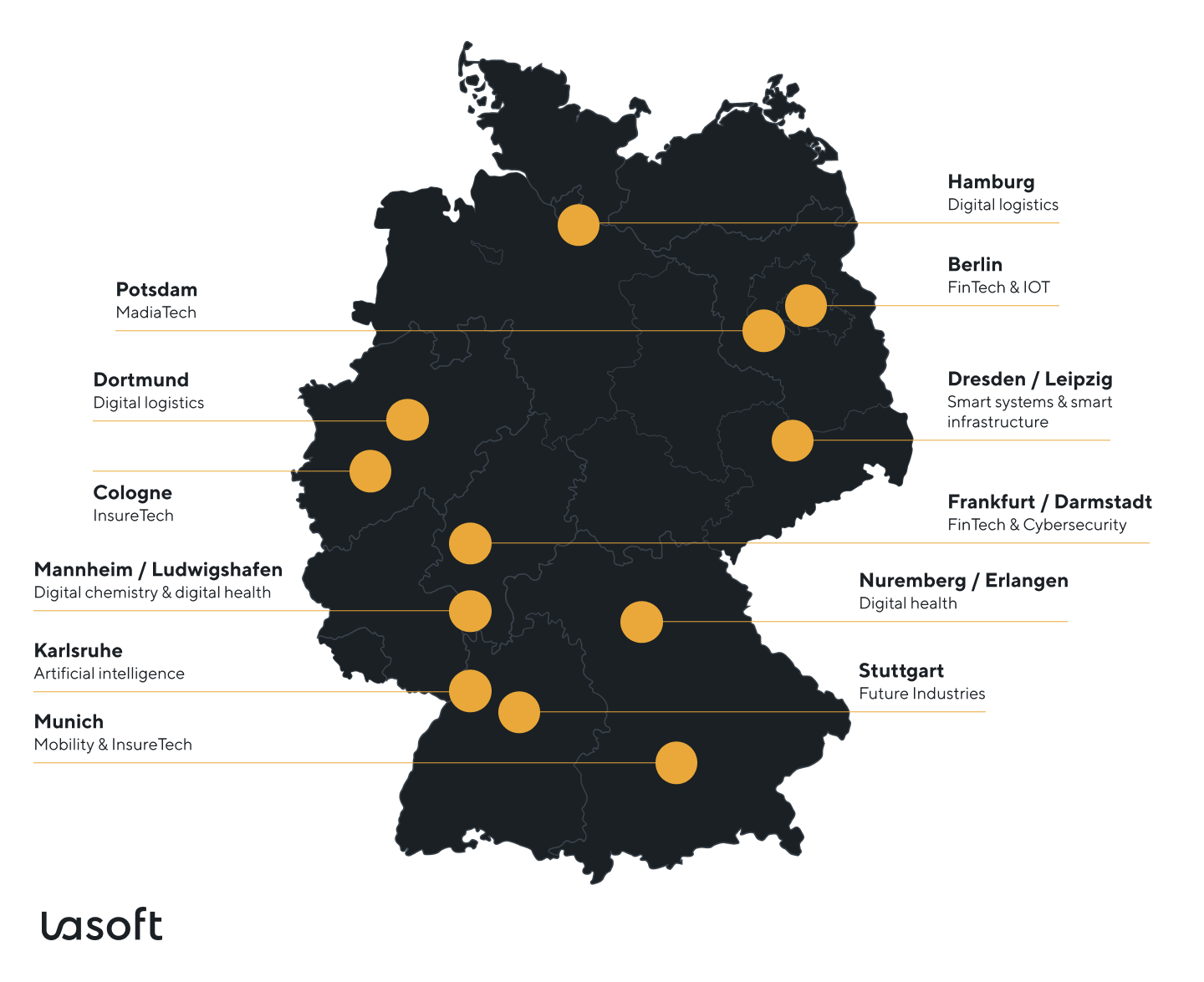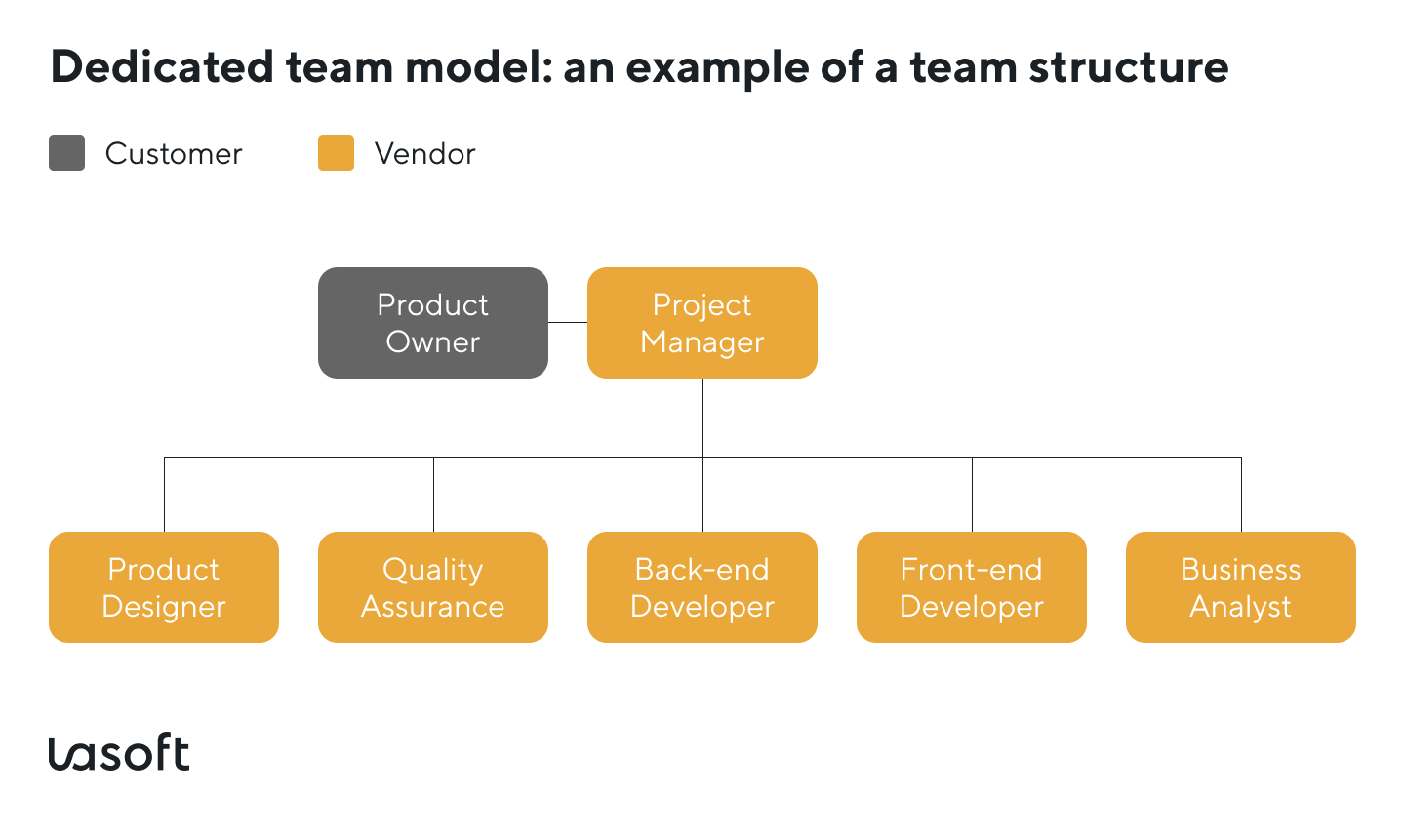We continue to research the IT skills shortage in European countries, examining how each country addresses this challenge and what practices and opportunities external providers may offer to address it. German companies, known for their cautious approach to nearshore IT outsourcing, are gradually opting for nearshoring to address the critical shortage of IT professionals.
In general, Germans have a cautious attitude towards outsourcing their IT tasks. They often prefer to maintain operations with an in-house team, as this is the safest way to ensure their business runs optimally and because they have concerns about data security. However, the somewhat tricky trend of IT skill shortages makes it even harder to maintain effective in-house operations.
Many companies offering their IT services are surprised that Germany is less open to external service providers than the UK due to cultural and language barriers. However, given the shortage of IT professionals, intense competition, and high wages, German companies have gradually become more open to outsourcing.
Outsourcing as a Solution: STEM Talent Shortage in Europe
The Commission’s Employment and Social Developments in Europe (ESDE) report for 2023 shows that despite the economic slowdown caused by Russia’s invasion of Ukraine in 2022, EU markets showed remarkable resilience throughout the year. The EU economy grew by 3.5% in 2022. Employment rates reached a record high of 74.6% at 213.7 million people employed, and the unemployment rate reached a historic low of 6.2%.
In 2022, sectors such as construction, healthcare, and STEM (science, technology, engineering, and mathematics) positions lacked skilled experts the most. These shortages is predicted to worsen with the expected decline in the working-age population in the EU from 265 million in 2022 to 258 million in 2030.
According to Euronews.Business: in 2023, in 21 European countries, 75% of employers reported difficulties filling vacancies, 82% in Germany in particular.

German IT Ecosystem: Trends & Insights
Germany is one of the most appealing countries for IT business with interesting projects, which has led to a booming tech job market. In 2023, there were 149,000 available jobs in Germany’s IT sector, up almost 12,000 from the year before. When we discuss in-demand IT talents, we’re talking about growing tech positions with a shortage of skilled candidates.
TOP 5 Tech Positions In-demand in Germany
- Data science and analytics;
- UX/UI design;
- Cybersecurity;
- AI and machine learning;
- Robotics and automation.
Source: Ironhack
Yearly Salary for IT Services in Germany
| Job Title | Range | Average |
| Software Engineer | €41k-€78k | €56,516 |
| Senior Software Engineer | €51k-€89k | €69,914 |
| Software Developer | €38k-€73k | €52,106 |
| Data Scientist | €44k-€74k | €53,367 |
| Front End Developer | €39k-€70k | €49,351 |
| Information Technology Consultant | €40k-€98k | €59,938 |
| Senior Software Engineer/Developer | €47k-€95k | €66,628 |
Source: PayScale
Germany boasts several major tech hubs, including Hamburg, Munich, and Karlsruhe, all of which have a significant presence in the tech sector. Each of these tech hubs in Germany specializes in specific tech divisions, attracting various tech companies based on their unique needs and focus areas. However, Berlin offers the most opportunities, as the city ranks third in Europe as a startup hub according to the EU Startup Magazine, and many IT giants are based here. Berlin is second to London and Paris, and it is forecasted that the city may soon take the second position in the ranking.
German IT Hubs
Potsdam – Mediatech
Dortmund – Digital Logistics
Cologne – Insurtech
Mannheim/ludwigshafen – Digital Chemistry & Digital Health
Karlsruhe – Artificial Intelligence
Hamburg – Digital Logistics
Berlin – Fintech & IOT
Dresden/Leipzig – Smart Systems & Smart Infrastructure
Frankfurt/Darmstadt – Fintech & Cybersecurity
Nuremberg/Erlangen – Digital Health
Stuttgart – Future Industries
Munich – Mobility & Insurtech

Source: De-hub
Friendly Reminder: Difference Between Nearshoring, Offshoring, and Outsourcing
When a company outsources IT processes to dedicated development teams in nearby countries, it is known as nearshore outsourcing. In contrast to offshoring, nearshoring partners are geographically close.
Offshore outsourcing involves outsourcing software development services to distant countries, often with significant time zone differences and language barriers.
Outsourcing is a general term for hiring external teams to carry out certain business functions, which leads to improved business outcomes.
Why Nearshoring Is the Solution for German Businesses: Key Benefits & Challenges
Nearshore outsourcing offers numerous benefits for companies in Germany. It allows them to hire dedicated development teams from Europe without immigration restrictions. Additionally, it enables German businesses to stay competitive with wealthier countries like the US by employing dedicated development teams at more affordable rates.
It is a popular opinion that it’s more convenient to hire IT talents from Eastern Europe with strong technical skills who also have proficiency in English, operate in the same time zone, be geographically close, which cuts your utility services rates, and share European cultural backgrounds. Moreover, Eastern European countries typically offer lower wages compared to Germany, making them ideal nearshoring external providers. So, what exactly do managed services and benefits offer for various types of companies in Germany, from startups and SMEs to large corporations?
Startups
Startups benefit from IT outsourcing by saving costs and gaining access to expert skills. By outsourcing their IT services to external providers, startups can free up resources and focus on core aspects of their business. These efforts help find high-quality IT support without the need for substantial in-house investment.
Medium-Sized Companies
For SMEs, IT outsourcing serves as a digital transformation tool that leverages advanced technologies and a dedicated development team of professionals to enhance their existing infrastructure. Outsourcing gives the in-house team space and time to focus on their core business activities while equipping their employees with the latest technologies and best practices, partnering with an experienced IT outsourcing provider.
Enterprises
Enterprises refine their IT strategies, stay competitive, and drive innovation through IT outsourcing. Outsourcing offers specialized expertise and cutting-edge technologies to ensure their IT systems are up-to-date and their processes are efficient. IT outsourcing facilitates due diligence consulting services and identifies options for introducing changes into legacy systems, enabling rapid adaptation to new market opportunities.
IT Outsourcing Market Challenges in Germany
While IT outsourcing offers numerous benefits, such as cost savings, access to specialized skills, and increased efficiency, companies must also be aware of the associated risks and challenges. Understanding these potential pitfalls can help businesses make informed decisions and develop strategies to mitigate these risks effectively.
In-House Preferences
Germans generally prefer in-house operations, as they believe that keeping IT tasks within the company ensures better control and security.
Language and Cultural Barriers
Language and cultural differences have historically hindered outsourcing in Germany. German clients prefer to speak and work in German, and that’s the factor to keep in mind. Effective communication is vital, and any barriers can lead to misunderstandings and inefficiencies.
Data Security Concerns
Data security is a top priority for German businesses. The fear of sensitive data falling into the wrong hands makes companies hesitant to outsource IT services, preferring in-house solutions where they can directly manage security protocols.
Outsourcing Models Types
Depending on their specific needs, companies in Germany can choose from various types of IT outsourcing models.
On-premise IT Outsourcing
You can choose on-premise IT outsourcing and order services from an external service provider who can manage your existing infrastructure. This model allows to offer their IT systems and applications and let the external service provider operate directly in their office, allowing on-site collaboration and immediate support.
Cloud-Enabled Outsourcing Teams
Cloud sourcing is a model that provides IT services through the cloud. Companies use the service provider’s infrastructure and get access to IT resources over the Internet. This model allows to easily scale resources based on their needs, providing efficient resource management and cost-saving solutions.
Dedicated Development Team Model as a Strategic Partnership
Companies can also form strategic partnerships with IT outsourcing service providers to build long-term relationships for IT support. In this model, the service provider becomes an extension of the company’s IT team, enabling close cooperation and alignment with business goals. Strategic partnerships are particularly beneficial when high customization, innovation, and continuous support are required.
A dedicated team is a group of professionals who work exclusively on your product for an agreed period. Unlike project-based development, where the project scope, price, and goals must be determined before development begins, the dedicated team model offers significantly more flexibility.
The dedicated team model is ideal for those seeking continuous development over an extended period. With this model, you will hardly notice any difference compared to in-house development. It offers you complete management control over your team, allowing you to decide which engineers to hire, when they should start, how long they should be employed, and what tasks they should undertake.

Why Choose Nearshore Software Teams From Ukraine and Poland?
Poland
Poland is home to one of Europe’s most talented and well-educated developers. IT nearshoring to Poland provides access to highly skilled developers who are proficient in English and German.
Top tech companies such as Google, Facebook, IBM, Accenture, and Cisco have established offices in Poland or collaborate with Polish vendors. Poland’s strategic location and abundance of skilled IT professionals make it an attractive destination for technical talent at a reasonable cost.
Overview of Average Brutto Rates for Software Engineers in Germany, Ukraine, and Poland
| Germany | Ukraine | Poland | |
| Junior | €4,500-5,000 | €1,500-2,500 | €3,000-4,150 |
| Middle | €5,500-6,500 | €3,200-4,500 | €5,600 |
| Senior | €7,000-10,000 | € 4,700-7,500 | €7,100-10,000 |
Ukraine
Despite the conflict with Russia, Ukraine’s IT community has shown resilience to many difficulties, continuing to develop successful software products for global markets. This resilience makes Ukrainian dedicated teams valuable partners for engaging in software development projects.
The cost of software development services in Ukraine is significantly lower compared to Western Europe and the United States. This substantial cost difference makes Ukrainian teams attractive for nearshoring, outsourcing, and offshoring IT projects. It’s also worth mentioning here that many Ukrainian teams opened their headquarters in different countries of the EU and the US to ensure seamless communication and short-distance location with their clients.
Final Insights
Outsourcing IT services is becoming a strategy for businesses seeking the best possible contracts with global IT service providers who can help improve existing infrastructure solutions or develop competitive software development projects. Germany is a country where IT services are in high demand, and IT outsourcing is a tempting solution to overcome many challenges.



